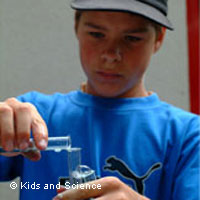New EU task force to boost science education
The European Commission has created an expert group to look into how best to support science education in Europe's primary and secondary schools. The new group will formulate policy recommendations designed to improve the way that Europe approaches science teaching and so ensure that future generations are well equipped to live and work in a knowledge-based economy. There is growing evidence that children and young people across Europe are increasingly losing interest in science and opting not to study it at university. At the same time, a recent Eurobarometer survey found that 80% of the adult population believes that young people's interest in science is essential for our future prosperity. 'A truly knowledge-based society needs its citizens to be involved,' said European Science and Research Commissioner Janez Potocnik. 'We have to do more to prepare our young people for a future that will require good scientific knowledge and an understanding of technology.' The new group brings together leading scientists with strong backgrounds in science education. Member Doris Jorde of the University of Oslo is President of the European Science Education Research Association, while Dieter Lenzen of the Free University Berlin used to be Chair of the German Society for Science Education. Other group members include Harriet Wallberg-Henriksson of the Karolinska Institute, who was a member of the Swedish Ministry of Education and Science's Expert Panels, and Peter Csermely of the Semmelweis University in Budapest, who won the Descartes Prize for Communication in 2005. The group will be chaired by MEP Michel Rocard, the former French prime minister. The experts will look into existing initiatives designed to promote good science education in Europe, such as the Pollen and Nucleus projects. The Pollen initiative aims to support science teaching in primary schools The Nucleus initiative is a cluster of projects which brings together research organisations, museums, science centres and universities across Europe. Achievements of the initiative to date include the establishment of Xplora, a European science education internet portal, the creation of a 'Science in Schools' journal and the running of a 'Science on Stage' festival.



